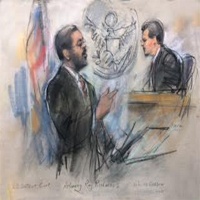Taylor Criminal Lawyer, Michigan
Sponsored Law Firm
-
 x
x

Click For More Info:
-
Richards & Associates, PLLC
200 East Big Beaver Road Troy, MI 48083» view mapCriminal Defense Accomplished Criminal Defense Attorney
If you face criminal charges, you deserve an experienced defense lawyer who has a reputation for winning the tough cases.
800-844-5250
Jerard M. Scanland
✓ VERIFIEDMotor Vehicle, Divorce & Family Law, Criminal, Accident & Injury, Civil & Human Rights
Attorney Jerard Scanland focuses his practice on criminal law, family law, auto-accident, and landlord tenant cases. Having completed training for the... (more)
Kenneth Robert Burger
Premises Liability, Family Law, Criminal, Personal Injury
Status: In Good Standing
Timothy M. Holloway
Civil Rights, Constitutional Law, Criminal, Criminal, Civil Rights
Status: In Good Standing Licensed: 35 Years
Robert P. Coutts
Family Law, Criminal, Credit & Debt, Bankruptcy
Status: In Good Standing Licensed: 35 Years
Bill Colovos
Litigation, Transportation & Shipping, Criminal, Consumer Rights
Status: In Good Standing Licensed: 39 Years
Robert J. Burger
Other, Estate Planning, Criminal, Bankruptcy & Debt
Status: In Good Standing Licensed: 37 Years
Steven C. Bullock
Family Law, Divorce, Juvenile Law, Criminal
Status: In Good Standing Licensed: 39 Years
Daniel Melican
Criminal, Personal Injury, Accident & Injury
Status: In Good Standing Licensed: 39 Years
Ricky J. Nelson
Commercial Real Estate, Family Law, Divorce, Criminal
Status: In Good Standing Licensed: 38 Years
 Ray Richards Troy, MI
Ray Richards Troy, MI AboutRichards & Associates, PLLC
AboutRichards & Associates, PLLC Practice AreasSpecializations
Practice AreasSpecializations

